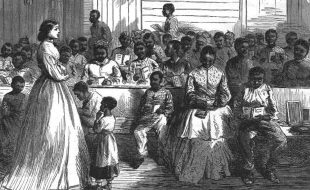| America's progress towards literacy has had a mixed history, but the march has been steady. While New England has long been considered the leader in learning, what with its Puritan emphasis on teaching basic skills to everyone -- girls as well as boys, poor no less than rich -- other sections have also (eventually) recognized the importance of the lamp of education. Margaret Douglas may have been alone in her effort, and she may have suffered "defeat" -- but her example shines through history as an inspiration to us today. She was indeed - Someone Who Cared. |

|
Black and White The ink is black, the page is white Together we learn to read and write (Read and write ) And now a child can understand This is the law in all the land (All the land ) The ink is black, the page is white Together we learn to read and write (Read and write ) The slate is black, the chalk is white The words stand out so clear and bright (Clear and bright ) And now at last we plainly see The alphabet of liberty (Liberty ) The slate is black, the chalk is white The words stand out so clear and bright (Clear and bright ) |
A child is black, a child is white The whole world looks upon the sight (A beautiful sight ) And very well the whole world knows This is the way that freedom grows (Freedom grows ) A child is black, a child is white The whole world looks upon the sight (A beautiful sight ) The world is black, the world is white It turns by day and it turns by night (It turns by night ) It turns so each and everyone Can take his station in the sun (In the sun ) The world is black, the world is white It turns by day and it turns by night (It turns by night ) |
|
Dangerous Minds River of Words Coach cared one library effort |

To learn to read is to light a fire; every syllable that is spelled out is a spark.
Victor Hugo
Toll free number 1-800-228-8813
Freedmen get yankee schoolmarms
|
From Kent Steffgen we learn the following.
In the years immediately following Appomatox, there were several philanthropic groups (Ladies "Missionary" endeavors, originating in the North) active in education of Negro freedmen -- including the American Missionary Association, the Freedmen's Aid Society, and the Methodist Episcopal Church, whose ladies home missions society was formed in 1866 in Ohio. That same year, the American Missionary Association sent out 353 teachers. But the appetite to help the poor Negroes was not easily quenched. The movement, if anything, was gaining momentum. In 1868 the American Missionary Association sent 532 more. Would the feminine touch of these Yankee church ladies be able to rescue the Freedmen just emancipated (by the stroke of Lincoln's pen)? The reality was that the whites suffered very greatly, and for the average yeoman farmer, literacy was almost as distant a goal as it was for their dark skinned fellow southerners. There had NEVER been free public (tax-supported) education in the Old South, and the way these Republican carpetbaggers went about imposing it was all wrong. Thus, these do-gooder ladies, with funding from northern churches, liberals, and philanthopists, rushed to "meet a need." Steffgen notes that the ladies of the American Missionary Association were largely volunteers from the ranks of the Congregational Church. I believe the Quaker Church was also intensely active in this teachers movement, though their ladies worked independently of the other churches. Steffgen also says that the Wesleyan Methodists, the Reformed Dutch Church, and the Free Will Baptists also sent teachers.In 1866 an estimated 1800 teachers were working in about a thousand schools with an approximate enrollment of 90,000 Negroes. By that time, few southern towns lacked Negro schools, though for whites, education -- often even basic literacy -- remained as it always had been, a luxury reserved by and large for upper class whites, the manorial elite so detested by poor white trash like Andrew Johnson, Hinton R. Helper, and a generation earlier -- the folk hero Andy Jackson. The attitude of the churches was a divisive attitude in the South. It was said that the "lower" denominations (these would include the holy roller or bible thumping type) were all too excessively influenced by the sorts of emotionalistic slave spirituality that de-emphasized theology, all but rejected hierarchy, and tended to see all men as equal before the throne of God. W.E.B. Dubois said the influence of black religion on these low "gospel" churches turned them into a "plain copy" of the slave style of worship, sometimes joyous and vibrant, sometimes poignant, often exuberant, but almost always capable of deep pathos. The decent and orderly denominations clung to their privilege, and scorned the heathenish manifestations of the ruder folk. The old line Episcopalians as well as the Presbyterians in the South seemed less inclined to the seductions of "African" exuberance. The Holy Spirit was a theological concept, not a green light for "wild religion." And there were other whispered concerns. It was rumored that the religious "promiscuity" of these (what later Americans call) pentecostal type meetings led physical promiscuity as well. Quoting Steffgen, "Methodism preached social equality to such a degree that in the southern mind it became synonymous with the advocacy of racial miscegenation. It is an oddity of history that, except for this early flurry of philanthropy by these "Angels of Mercy" from northern churches, Reconstruction wound up benefitting poor white southerners more than it did the emancipated Africans. Reconstruction had been designed with the clever Republican agenda of ensuring Republican political control of southern wealth (once the economy could be restored). Instead, the real beneficiary of Reconstruction turned out to be poor whites, who for the first time had public supported access to basic education, had the barriers removed to civic participation, with a significant increase in actual voting. The solid Republican South of Reconstruction became the solid Democratic South once the blacks were dissuaded from voting. Whites indeed resorted to a certain degree of violence, which is perhaps a blotch on the record of post-Republican Dixie. And while the opposing "sides" battled for political gains, the victims were neither one "side" or the other -- the real victims were the children of America. (picture) Both black and white. History is not always neat and tidy. Those who write its annals are tempted to frame the past in melodramatic terms, with good guys in shining armor and nasty villains lurking in the shadows. In reality, the motives of participants are far from being so clear cut. (At least so claims yours truly, Bob Shepherd). A popular adage goes, There's so much good in the worst of us And so much bad in the best of us That it hardly behooves any of us To judge too harshly the rest of us. |


To email me

the ink is black ~ the page is white ~ together we learn ~ to read and write